Diversity

Approach
Empowering Diversity, Creating Value
Since its founding, Epson has been guided by a spirit of creativity and challenge. We attract talent from around the world with diverse backgrounds and perspectives. Our people take ownership of their roles and projects, actively contributing to the creation of value. We believe that embracing diversity enhances our organizational creativity and serves as a driving force for the sustainable growth of our corporate value.
Concrete Actions
| Issues | Strategic Direction of Initiatives | Key Actions |
|---|---|---|
| Gender equality |
Enable all employees to fully demonstrate their abilities regardless of gender. Eliminate existing gender gaps and avoid creating new ones by motivating women to seek advancement and by promoting a company-wide shift in mindset, particularly among management. |
• Career training for women leaders - Discussions with the CEO - Discussions with internal and external role models • Career support for veteran women employees - Individual career training - Skills training - Seminars on thesis composition and interviews for promotion • Mentoring program for young women • Develop future manager through internal and external training. • Diversity management training for new managers • Group-wide diversity leader meetings and the Diversity Council among Group companies in Japan |
| Advancement of people with disabilities | Enable people to contribute to the company’s performance by taking on challenges and continuing to grow regardless of whether they have disabilities. Achieve a 3.0% real employment rate of people with disabilities in FY2030. |
• Create a work environment where people with disabilities can thrive. • Provide more opportunities for people with disabilities at special subsidiaries and share the knowledge within the Group • Provide consultation for people with disabilities |
| Flexible work location and working hours |
Promote work-life balance, enhance motivation and productivity, and drive greater results by expanding options for where and when employees work |
• Evolve the work-from-home program. • Set guidelines for days in the office in a hybrid work model. • Eliminate core hours in the flextime system. |
| Balancing work with childcare, elder care, or fertility treatment | Create an environment where employees find purpose in their work, can adapt to different life stages, and continue to thrive and contribute to value creation. |
• Post interviews on the intranet with employee role models who are balancing work with childcare or other caregiving responsibilities. • Provide support for balancing work and childcare. - Parenting seminar - Paternity leave promotion(PAPA-up Project) • Provide training for managers in balancing work and elder care. • Introduce leave systems for fertility treatment. |
Gender Equality
Action Policy
Swiftly act to ensure that women are organically and equitably represented at every level of the organization. To do so, eliminate existing gender gaps and avoid creating new ones.
Revision of the Action Plan Based on the Act on Promotion of Women's Participation and Advancement in the Workplace (a three-year plan for FY2023-25)
- Aim to have female employees account for 8% of management positions and 10% of leadership roles (equivalent to assistant manager) by March 2026.
- Recruit new graduates, with a goal of securing at least 25% women.
- Encourage employees to take at least 20 days of paid leave per year.
- Aim to achieve 100% childcare leave rate for both men and women.
To achieve the goals outlined in our action plan, we are implementing a range of initiatives specifically designed to support the advancement of women. These initiatives have led to a steady increase in the number of women in managerial positions and in the pipeline for future leadership roles. We remain committed to continuing these initiatives to ensure we reach our targets.
Career Training for Female Leaders
Challenges faced by women in leadership positions have been highlighted through internal surveys. The challenges include things such as a lack of relatable role models and a perception that they must conform to a male-centric, uniform leadership style to succeed in management.
To address these issues, we launched a training program for senior female staff in FY2023. The program aims to promote understanding of diverse leadership styles, help participants recognize their strengths, and encourage them to pursue management roles. It includes discussions with the company president and interactions with internal and external role models.
Of the 44 participants to date, eight have been appointed to management positions.
Career Support for Veteran Female Employees
There is a clear gender gap when it comes to the promotion of mid-career and senior employees. To try to close this gap, Epson introduced initiatives in FY2021 to encourage employees aged 40 and above to take promotion exams (which are graded equally for all). These initiatives include career training to review one’s own career path, portable skill-up training to strengthen job skills, and targeted programs such as thesis writing and interview preparation courses to build the competencies required for promotion.
Mentoring Program for Young Women
Survey results have revealed a gap in career ambition between young men and women. One contributing factor is the limited availability of relatable role models, which can make it difficult for young women to envision their career paths and may lead to hesitation in pursuing new challenges.
To address this, Epson offers young women employees mentoring sessions with multiple role models, career development workshops, and discussions with Epson managers to help spark career awareness and motivation. Peer discussions among young women employees are also held to foster internal networking and mutual support.
Balancing Work with Childcare, Elder Care, or Fertility Treatment
Action Policy
Design and implement initiatives to create an environment where employees find purpose in their work, can adapt to different life stages, and continue to thrive and contribute to value creation. Specific initiatives are described below.
Support for Balancing Work and Childcare
Many employees have expressed concerns about balancing family responsibilities with work and have said that there are no visible role models around them. To address this, Epson features interviews on the company intranet with employees who are successfully managing both childcare or caregiving and their careers. These stories highlight diverse approaches to work-life balance and offer practical insights for others seeking to do the same.
We also host parenting seminars for employees who are expecting children or currently raising them. These seminars provide opportunities to share concerns and experiences, foster mutual understanding, and offer encouragement. Topics range from preparing for parental leave to strategies for balancing work and childcare after returning to the workplace.
Paternity Leave Promotion (PAPA-up Project)
We want mothers and fathers to be equally involved in childcare and to successfully balance work with their childcare responsibilities. To enable this, we are working to foster a culture in which taking parental leave is considered the norm across the organization.
As a first step, we set a 100% uptake target for childcare leave, for both eligible men and women, in FY2022. This is in line with Japan’s revised Child and Family Care Leave Act. The uptake rate for men was 97.2% in FY2022, 85.2% in FY2023, and 91.6% in FY2024. We remain committed to achieving a 100% uptake rate and will continue efforts to increase the number of days taken by men.
Support for Balancing Work and Elder Care
A company-wide survey showed that many employees are concerned about balancing work and elder care. Epson responded by establishing an internal consultation service to provide support and guidance on elder care-related matters.
In FY2023, we conducted diversity management training for all Epson Group managers, focusing on the theme of balancing work and elder care.
The following year, we invited representatives from a local community comprehensive support center to provide employees with training to prepare them for elder care.
Leave Programs for Fertility Treatment
Epson recognizes that fertility treatment comes with challenges. It is mentally and physically stressful, and the scheduling of clinic visits can be an issue. Epson is working to alleviate some of the burden by creating programs that allow employees to balance fertility treatment and work.
As a first step, in FY2022 we expanded our leave programs. The Life Support leave program provides five days of paid leave per year, in either full-day or half-day increments. The Life Support Leave of Absence program allows employees to take up to 365 days of leave over a three-year period.
In addition to these programs, we are actively promoting workplace understanding of fertility and fertility treatment and are raising awareness to prevent harassment. Our goal is not only to create programs, but also to foster a culture where employees feel comfortable using them.
Work-from-home program
Originally introduced to support employees balancing work with childcare or elder care responsibilities, Epson’s work-from-home program has been expanded and is now available to all employees. Employees can now work from a wider range of remote locations, giving them more flexibility in how they work.
Babysitter Subsidy
Since October 2005, Epson has provided financial support for employees using babysitter services. The company has gradually increased the subsidy over time. It currently fully covers the cost for up to 16 hours of babysitting services per month.
Help for Employees with Children on Nursery School Waiting Lists
In recent years, the issue of children on waiting lists for daycare has emerged not only in the Tokyo metropolitan area but also in Nagano Prefecture, where Epson’s major business sites are located. To address this challenge, Epson is promoting partnerships with company-led childcare nursery schools located in the areas where our employees live.
As of July 2025, we have partnered with eight such facilities.
Certification by External Parties

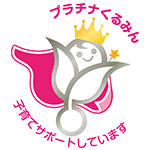
Diversity Indicators (as of March 2025)
Percentage of Women in Workplace and in Management
| Group Total | Japan | Except Japan | ||||
|---|---|---|---|---|---|---|
| Male | Female | Male | Female | Male | Female | |
| Percentage of regular employees | 54.5% | 45.5% | 80.1% | 19.9% | 45.0% | 55.0% |
| Percentage of managers | 83.1% | 16.9% | 93.8% | 6.2% | 74.6% | 25.4% |
*Manager is section manager and department manager.
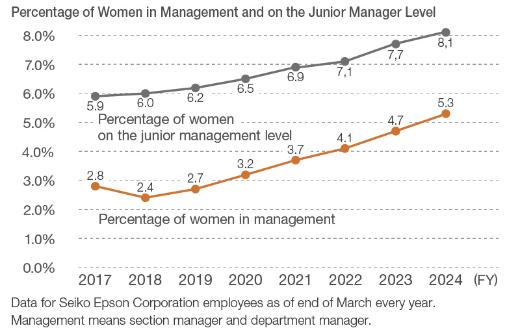
Childcare Leave Trend (Men)
| FY2021 | FY2022 | FY2023 | FY2024 |
|---|---|---|---|
| 50.8% | 97.2% | 85.2% | 91.6% |
* Data for Seiko Epson Corporation employees as of March 20 every year
* Calculation formula from FY2022: Number of employees who took childcare leave in the fiscal year divided by the number of employees who gave birth or whose spouse gave birth in the fiscal year.
Calculation formula for previous fiscal years: The number of people who took childcare leave divided by the number of people eligible for leave (i.e., those who gave birth to a child and who became eligible to take childcare leave).
Ratio of Women’s Wages to Men’s Wages.
| FY2021 | FY2022 | FY2023 | FY2024 |
|---|---|---|---|
| 75.7% | 76.7% | 76.8% | 77.5% |
* Data for Seiko Epson Corporation employees
Men and women at the same grade receive equal pay under our compensation system. The primary reason for the overall disparity is the lower representation of women in higher-level positions and grades. Among management-level employees, the gender pay ratio stands at 98.2%.
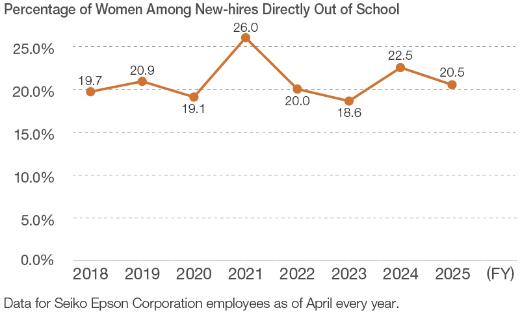
Advancement of People with Disabilities
Epson's Vision for Advancement of People with Disabilities
Epson regards the advancement of people with disabilities as a key diversity priority. We seek to create conditions that allow all individuals to make meaningful contribution by continuously challenging themselves and growing at a pace aligned with their roles and responsibilities.
To realize this vision, we are actively working to build connections and raise awareness both within and outside the company. This includes sharing information and promoting understanding, as well as expanding new business initiatives through our special subsidiaries. These efforts are designed to enhance recruitment and create opportunities for people with disabilities to thrive within the organization.
Concrete Actions
・Creating conditions where people with disabilities can thrive.
- Provide online learning courses and training for managers to promote understanding of people with disabilities.
- Host workshops for key personnel involved in promoting disability inclusion to exchange ideas and best practices.
- Organize external events focused on developmental disabilities.
- Provide work experience opportunities for students with disabilities, including those with developmental disabilities.
・Expanding opportunities through special subsidiaries and knowledge sharing across the Group
- Develop new business areas in office support tasks to create more opportunities for employees with disabilities.
・Offering dedicated support through an internal consultation service.
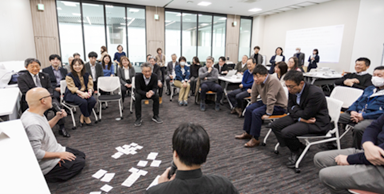
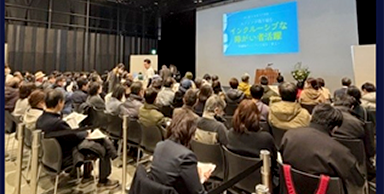
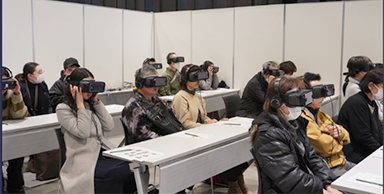
Seiko Epson has set a goal of achieving a 3.0% real employment rate of persons with disabilities by the end of FY2030 and is actively pursuing inclusive hiring throughout the Group. As of June 1, 2025, the Group's employment rate stands at 2.58%.
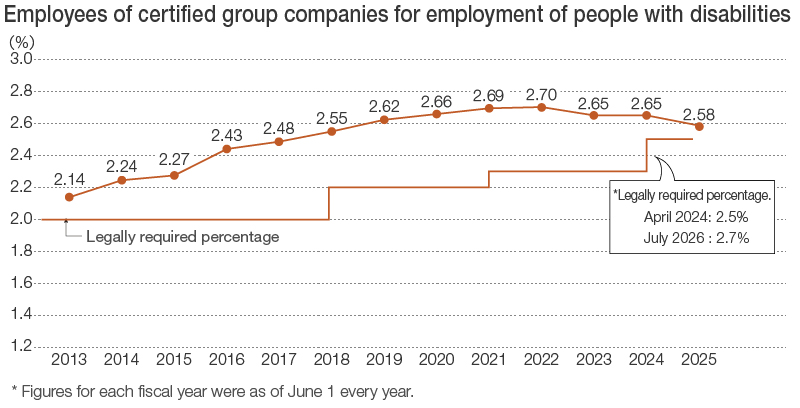
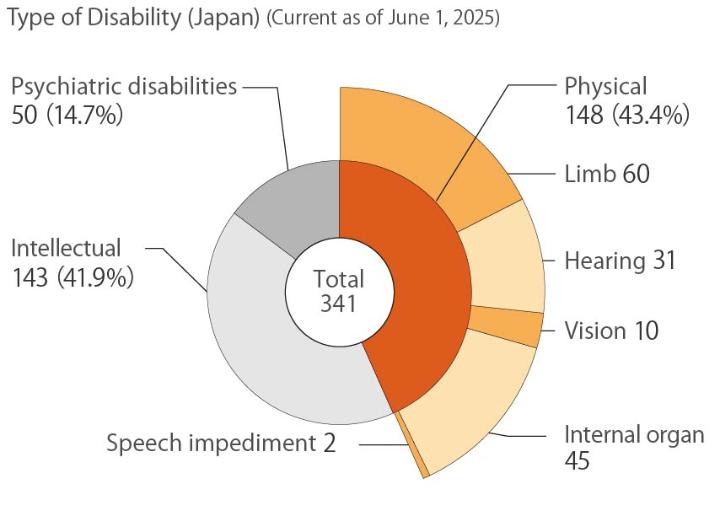
Initiatives of Special Subsidiaries
Epson was a pioneer in setting up special subsidiaries in Japan. In 1983, Epson Mizube was established, followed by Epson Swan in 2001. These companies have played a key role in steadily advancing Epson’s employment of people with disabilities. Drawing on over 40 years of experience and expertise, they prepare work environments tailored to the characteristics of each individual’s disability. Through the development of new business areas, they continue to create opportunities for employees to leverage their abilities and grow, while contributing to a more inclusive workplace.
Epson Mizube Corporation
As of June 1, 2025, Epson Mizube employs 156 people with disabilities across six locations, working in diverse fields such as office support, manufacturing, and environmental recycling.
One of its core operations, building cleaning services, has grown significantly since its launch in 2008, with 70 employees engaged in this work as of March 2025.
Since 2017, Epson Mizube has also expanded employment opportunities through the upcycling model line of the PaperLab system. Employees sort used paper, operate the PaperLab, and produce business cards and notebooks using DFP (Dry Fiber Paper), contributing both to environmental sustainability and inclusive employment.
To further expand employment for people with physical and mental disabilities, Epson Mizube is promoting office work supported by IT tools.



The company also actively participates in the Abilympics (skills competition for people with disabilities) to enhance professional skills. In FY2024, three employees competed in the National Abilympics, with one earning a bronze medal in the Office Assistant category. The efforts of these participants and the support from their teams serve as a source of motivation for other employees with disabilities and contribute to a vibrant workplace culture.
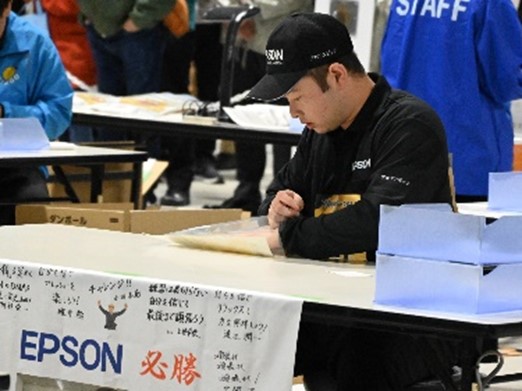
Epson Swan Corporation
Located within the premises of Tohoku Epson Corporation, Epson Swan employs 26 people with disabilities (as of June 1, 2025). These employees clean cleanroom garments, clean Tohoku Epson buildings, and since October 2020, sort used paper for upcycling by a PaperLab system. Cleanroom suit cleaning has been a core part of Epson Swan’s business since its founding. It provides this service to multiple Seiko Epson sites as well as to other local companies.
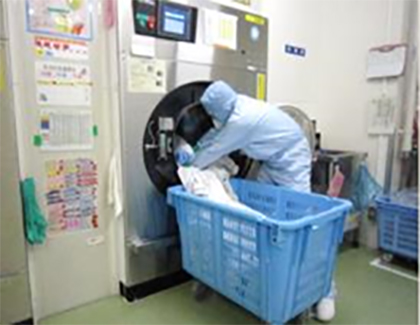
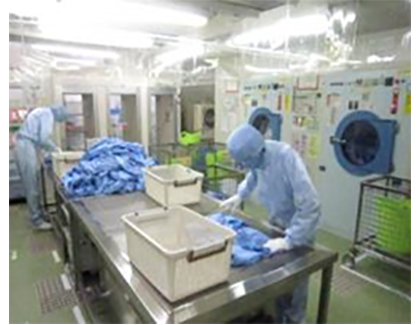
Epson Swan also places strong emphasis on human resource development and actively encourages participation in the Abilympics building cleaning category. Employees have competed every year since FY2014. Finally, in FY2024, marking the 11th year of participation, an employee won the Excellence Award at the Yamagata Prefecture competition and advanced to the national finals.
Earning recognition for the skills developed on the job boosts confidence and serves as motivation.
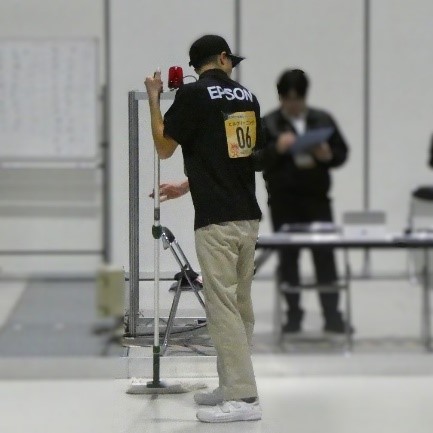
Global Talent Development and Engagement
Epson has established a global network of sites to accurately identify—and quickly and flexibly meet—the changing needs of customers over time in different regions. With approximately 75,000 employees worldwide, we respect local cultures and customs, promote local hiring, and actively develop and appoint local talent. Through these efforts, we aim to contribute to local communities and build relationships that enable mutual growth.
Delivering value to customers requires the efficient operation of our globally integrated value chain. To support this, Epson cultivates global talent with broad expertise across functions, capable of coordinating operations from a holistic perspective and making timely, informed decisions on the ground.
We conduct annual leadership development seminars for executives at overseas subsidiaries and facilitate talent exchange between Japan and our global offices. This includes assigning personnel abroad and accepting secondees and trainees from overseas to foster locally empowered leaders.
In collaboration with local top management and HR departments, we define roles and requirements for key positions and formulate succession and development plans for high-potential talent. These initiatives underpin our efforts to build an optimal global talent structure aligned with Epson’s long-term strategy.
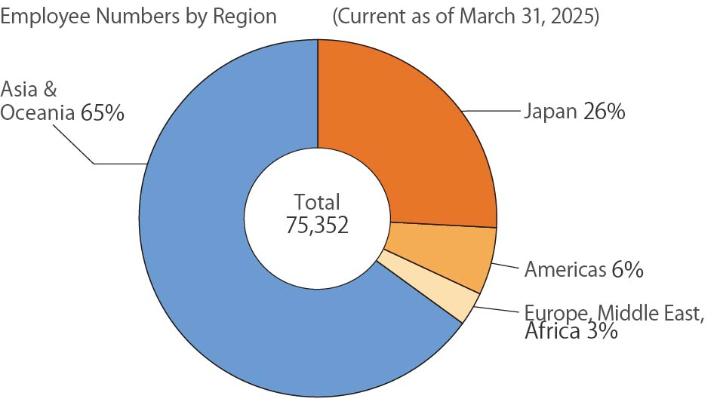
Global Talent Management
Epson is actively promoting the appointment and development of global talent, including personnel at overseas subsidiaries. Using the same role evaluation tools applied in Japan, we assess the scope and significance of each position at our international sites. This allows us to identify key roles, clarify their responsibilities and requirements, and ensure that the most suitable candidates are selected—regardless of age, gender, or nationality. To support this, we collect comprehensive data on potential candidates, including basic information, competencies, and 360-degree feedback.
Leveraging this data, we conduct talent reviews globally, just as we do in Japan. These reviews involve close collaboration with local offices to assess workforce status, consider succession plans, and support leadership development.
As a result of these initiatives, local talent now holds key leadership positions across our global operations. For example, the CEO of our regional headquarters in the United States is a locally hired executive who oversees the management and operations of subsidiaries throughout the Americas. In Southeast Asia, a local leader has been appointed as the head of the regional headquarters, managing sales operations across the region. In Europe, all subsidiaries under the regional headquarters are led by local executives, and local talent is increasingly being appointed to leadership roles at sales and manufacturing sites worldwide.
Currently, 40% of board members at overseas subsidiaries are non-Japanese, 66% of CEO positions are held by non-Japanese leaders, and 90% of managerial roles are filled by locally hired personnel.
Global Talent Development Initiatives
The Global Incubation Seminar (GIS)
The Global Incubation Seminar (GIS) is a leadership development program designed for next-generation leaders at Epson’s overseas subsidiaries. Since its launch in 1999, GIS has provided participants with a deeper understanding of Epson’s corporate philosophy and purpose, while fostering the ability to think critically about their organization’s role and strategic challenges. As of May 2025, more than 400 individuals have completed the program, many of whom now serve in executive and managerial roles across the Epson Group.
In fiscal 2025, 24 participants from 15 countries took part in the week-long seminar. The program included site visits, dialogue sessions with President Yoshida, strategic briefings from division heads, and the Epson Leadership Session. Through these activities, participants deepened their understanding of the Epson Way—our shared values and principles—and reflected on how their personal values align with Epson’s purpose.
During the Epson Leadership Session, participants acquired essential leadership knowledge, skills, and mindset. They then developed action plans to enhance the value of Epson within their respective organizations and presented these plans directly to senior management. The seminar also facilitated meaningful communication with executives, helping participants gain insights into Epson’s long-term vision and business strategies. By sharing challenges and initiatives across regions, functions, and businesses, participants built a strong foundation for cross-border collaboration.
Feedback from participants highlighted the value of the experience:
“President Yoshida shared his thoughts while answering questions, which helped bridge the gap in understanding his vision.”
“The program was useful in many areas, including mission setting, execution processes, and teamwork.”
Epson will continue to offer this program to empower diverse talent around the world, ensuring they become a driving force for the next generation of Epson’s global growth.
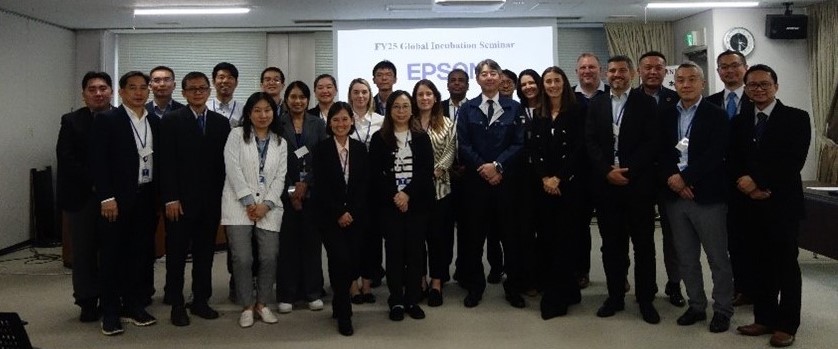
Acceptance of Overseas Trainees
Epson actively welcomes technical trainees and interns from its overseas manufacturing sites to Japan for periods ranging from three months to one year. Through structured training programs, these individuals gain skills and knowledge that are difficult to acquire locally, while deepening their understanding of Epson’s business processes and operational standards.
Since the program began in 1988, Epson has hosted a total of 1,842 trainees. In fiscal 2024 alone, 40 trainees were accepted from subsidiaries in Indonesia, the Philippines, Malaysia, and Thailand.
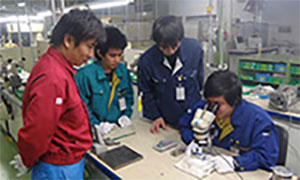
Initiatives for Global Facility Workforce Planning
In the past, Epson has dispatched personnel from Japan to manage facility operations—including construction, maintenance, and administration—at manufacturing sites across Asia. In response to evolving business needs and workforce dynamics, we are now working to enable local talent to take on facility management roles at overseas subsidiaries.
To support this transition, Epson Japan and local subsidiaries jointly conduct workforce reviews, including succession planning and development strategies. In fiscal 2024, as part of a three-year initiative aimed at enhancing operational and maintenance skills, as well as strengthening management and communication capabilities, we welcomed three employees from overseas subsidiaries to Japan. These individuals are now contributing significantly to facility operations in Japan.
We also accept short-term trainees from overseas sites to help junior and mid-career employees build foundational skills and gain practical experience and knowledge through technical training programs.
Workforce Composition and Service Period
Workforce Composition
| Male/Female Ratio | Mgmt. Diversity | Junior Mgmt. Ratio*1 | |
|---|---|---|---|
| Female | 17.6% | 5.3% | 8.1% |
| Male | 82.4% | 94.7% | 91.9% |
* Data for Seiko Epson Corporation employees as of March 31, 2025.
*1 Team leader
Length of Employment
(Unit: Year)
| Total | Female | Male |
|---|---|---|
| 18.3 | 18.4 | 18.7 |
* Data for Seiko Epson Corporation employees as of March 31, 2025.
Turnover Rate
| FY2020 | FY2021 | FY2022 | FY2023 | FY2024 | |
|---|---|---|---|---|---|
| Total turnover ratio | 4.5% | 4.4% | 5.1% | 3.9% | 4.5% |
| Voluntary turnover ratio | 1.4% | 1.5% | 2.2% | 1.2% | 1.5% |
* Data for Seiko Epson Corporation of March 20 of that year.


